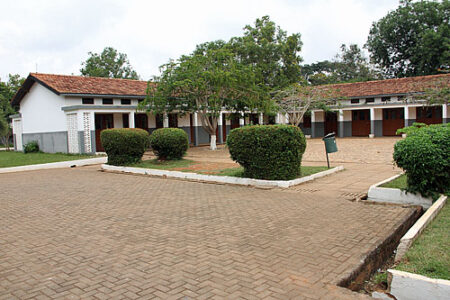Rajvir Rai, UCSB
This case study examines language education at the University Basic School (UBS) in Accra, Ghana. A linguistic anthropological perspective is used to address concerns in public Ghanaian language education, showing how linguistic anthropology can support educational research Discourse analysis from structured interviews with four UBS language teachers (Twi, Ga, French, and English) explores key issues: resource use, the influence of English on native language literacy, teacher training and pedagogical approaches. Teachers voice that English has become a dominant force in academia, affecting the use and proficiency of native languages. To counteract this, they implement strategies such as code-switching, conflict resolution, and dramatization to integrate cultural understanding into their language teaching. Past the effective use of oral and written resources, teachers advocate for language laboratories and higher participation in teacher training to enhance native language learning.
University Basic School is located on the University of Ghana campus. It is attended by students of faculty and the surrounding community (University Basic School, Legon). It is a public and primary K-6 school with a selection of four language courses: Twi, Ga, French, and English. UBS’s approach—utilizing both English and native languages in teaching—could serve as a transnational model for other schools. This school as a case study explores conditions of teacher training and resource use that shape its language education and perspectives on preserving mother tongue education.
The language context of Ghana is one in which around 73 languages are used in conversational, daily settings while English is utilized within educational and professional environments (Reilly et al., 2023). Given Ghana’s language diversity, agriculture as a workforce comprises more than half of the working population and does not require literacy in English (Agbedor, 1994). Further, more than eighty percent of the population is involved in informal work that is not English-intensive (Reilly et al., 2023). An elite minority has consequently been claimed to form in education systems where English-speaking students continue through tertiary education to pursue high-value employment (Agbedor, 1994). Others complete the primary level to directly enter agriculture or informal work.
Existing literature on language education is concerned with inadequate language teacher training and resource scarcity. Nearly a quarter of teachers are untrained in a Ghanaian language for instruction, suggesting that native language learning may not be effective (Owu-Ewie, 2019). Regarding resource use, public schools statistically show more issues surrounding lack of books, supplies, poor teaching, and poor facility conditions (Adoho et al., 2014). This research aims to explore the perspectives of UBS teachers on language education in the face of evolving language use and resource concerns. There are three objectives that will fulfill the aim of exploring UBS teacher perspectives on language education: defining teacher concerns regarding resources that facilitate education, discussing if English discourages the literacy of native languages in the classroom, and whether language teacher training provides quality education.
Language teachers acknowledge the global advantages of English, including its role in globalization. The teachers’ insights reflect an issue in multilingual contexts: the balance between promoting a global language and preserving local languages. While essential for students’ participation in the global economy, English is also seen as contributing to the erosion of native languages due to observed trade-offs in reading, speaking, and writing fluency. This situation aligns with existing literature, which suggests that the dominance of English in education can marginalize native languages and contribute to their diminished use among younger generations (Agbedor, 1994; Martin, 1976). UBS teachers noted that English’s early introduction, alongside its pervasive use in media, discourages the use of native languages at home and in informal settings. This aligns with concerns that while English opens doors to higher education and formal work, it may also lead to a disconnection from local cultural practices for younger generations.
The effective teacher training and approaches observed at UBS—emphasizing class management, student interaction, and innovative teaching approaches—demonstrate potential pathways for student success and language learning. However, attracting more teachers to these training programs remains a challenge. The reluctance or lack of interest in attending workshops may be linked to systemic issues such as inadequate funding and support (Ministry of Education, 2017). In terms of resources, UBS teachers expressed a nuanced view. While they can access basic materials such as workbooks and activity books, there is a notable gap in advanced educational tools like audiovisual aids and language laboratories. This lack of resources affects the depth of language instruction, potentially hindering students’ full language development. This highlights a need for investment in educational technology to enhance language learning experiences (Adoho et al., 2014).
Teacher training that includes native languages could mitigate the mismatch issue between teachers’ and students’ native languages (Owu-Ewie, 2019). This can prevent the intensification of an English-speaking elite minority as students remain connected to their linguistic and cultural heritage. UBS’s language education underscores the importance of balancing global language proficiency with the preservation of native languages. By addressing resource limitations and enhancing teacher training, public schools in Ghana can better support multilingual education. The mother tongue early education policy should be enforced at all schools in this critical stage of student’s linguistic development. Investing in language laboratories and audiovisual resources to improve native language instruction should come with promoting or encouraging more teaching individuals to take advantage of training opportunities/scholarships. On a governmental level, international initiatives and campaigns need to be aimed at preserving native languages. This includes addressing the need for textbooks and educational materials that are culturally relevant and written in local languages. Textbooks should be written by an author who is a native speaker as it sustains the cultural aspect of language.
